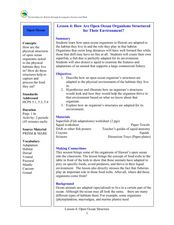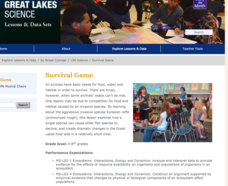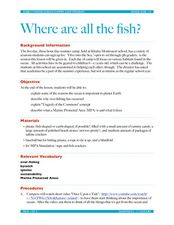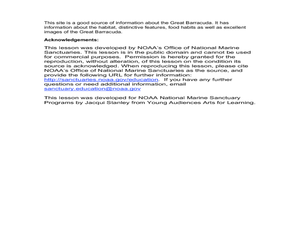Howard Hughes Medical Institute
Ocean Acidification
Human impacts on the environment can sometimes be difficult to measure, especially under water! An activity centered on ocean acidification gives science scholars the opportunity to examine the effects of carbon dioxide on marine life....
NOAA
Build Your Own Ocean Ecosystem
Hold the sea in the palm of your hand! Amateur oceanographers work together to create models of an ocean ecosystem in the sixth and final installment in a series. Raise awareness of global ocean health issues through guided research,...
Wilderness Classroom
Ocean Life
Our oceans are composed of many complex relationships. Young oceanographers explore relationships between organisms, understand the world ocean's currents, and discover the effects of water pollution and how it behaves. There are...
Curated OER
Big Fleas Have Little Fleas
A benthic habitat hosts a vast collection of organisms and its structure influences the biodiversity. Middle-school marine biology explorers will discuss how corals impact structure, and therefore diversity, on the ocean floor. They draw...
Curated OER
Wildlife
First, biology pupils research land and marine habitats along the route of skipper Rich Wilson's Great American II. Then, using colored paper clips scattered across a colored paper background, they play the predator-prey game to...
Curated OER
Wildlife
The centerpiece of this lesson plan is a predator-prey simulation in which colored paperclips represent different species of animals camouflaged against a colored background. Relevant follow-up questions are provided. The activity is...
Curated OER
How Are Open Ocean Organisms Structured for Their Environment?
Students explore biology by conducting an animal dissection. In this oceanography lesson, students identify the life cycle of a squid and other animals that are involved with commercial fishing. Students dissect a squid in class and...
Curated OER
What's in that Cake?
Learners discover the methods scientists use to investigate Oceanic habitats. For this oceanography lesson, students utilize the Internet to identify deep sea submersibles and how they help scientists study the Charleston Bump....
Curated OER
Mapping the Ocean Floor
Students study the bottom structure of underwater habitats and how they can be mapped.
Curated OER
Ocean in a Bottle
Students create an enclosed ocean in a bottle and add different pollutants to explore the effects of pollution on the environment.
Curated OER
Climate Change Challenge
Students participate in a demonstration in which they role-play polar bears and habitat components to demonstrate the impacts of climate change on the Arctic Ocean ecosystem.
Michigan Sea Grant
Survival Game
Musical chairs may be a classic game, but Ruffe Musical Chairs is a unique lesson on invasive species! Using the time-honored game, pupils role play the behaviors of the invasive fish called Eurasian ruffe. Learning about this aggressive...
Curated OER
Faking It
Middle school earth scientists describe the behavior of the Coriolis force. They compare and contrast conditions under which the Coriolis force has a significant impact with conditions under which it has very little. They model the...
NOAA
Biological Oceanographic Investigations – Through Robot Eyes
How can a robot measure the length of something when we don't know how far the camera is from the object? The lesson explains the concept of perspective and many others. Scholars apply this knowledge to judge the length of fish and the...
Curated OER
Where Are All the Fish?
Students identify the problems that marine life is facing today. In this marine science lesson, students explain how Marine Protected Areas can help the ocean and the fish. They brainstorm ways to help in the conservation effort.
Curated OER
A Monument for Marine Conservation
Young scholars explore the Northwestern Hawaiian Islands to discover what's there and pick up clues as to how people have both harmed and helped the native habitats. They study another protected area and see how to balance conservation...
Curated OER
Cut-off Genes
Investigate the relationships between different deep-sea organisms by DNA sequencing. A worksheet provides instructions for DNA sequencing and space to work. They simulate gel electrophoresis by cutting out paper "DNA strands."...
Curated OER
Boom and Bust
Students investigate commercial fishery. In this fishery lesson, students describe stages in commercial fishery, interpret data and predict when a fisher stock is showing signs of overexploitation.
Curated OER
The Great Barracuda
Students explore oceanography by researching the great barracuda. In this animal life lesson, students read several vocabulary terms dealing with ocean life and examine a drawing of a barracuda. Students examine the many...
Curated OER
Fish Fashion 101
Young scholars explore fish anatomy. For this fish anatomy and adaptation lesson, students define and identify the location of fish body parts. Young scholars add these parts of a fish's anatomy to a life-sized fish costume worn by a...
Curated OER
Sea Turtle Savvy
Young scholars explore sea turtles. They create paper plate sea turtles and brainstorm other organisms that live in the sea turtle's habitat. They role-play scenes from a nonfiction book, A Baby Sea Turtle's Journey. They play a game...
Curated OER
The Environments of Big Sur -- Which Do We Protect?
Students investigate the geological, climatic, and biological features of Big Sur. They watch a video, conduct Internet research, and create a script and images in the form of an outline in a simulation of an environmental group.
Curated OER
All Hands on Deck: A Harbor Education Program
Students build a model of an estuary. In this wetland instructional activity, students build a model estuary with a paint tray and modeling clay. They use the model to illustrate the impact of non-point pollution on the watershed.























